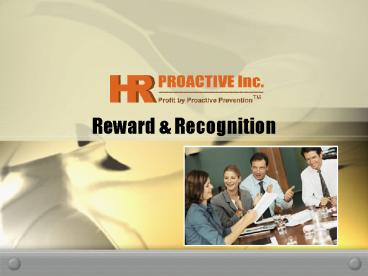Reward - PowerPoint PPT Presentation
1 / 14
Title: Reward
1
Reward Recognition
2
Reward Recognition
- Objective
To provide you with tools and enhance your skills
so that you can implement an informal reward and
recognition program that will be meaningful to
your employees and will also meet the needs of
the organization.
3
Reward Recognition
- Maslows Hierarchy of Needs
Self-Actualization Esteem Needs Social
Needs Security Needs Physiological Needs
4
Reward Recognition
- Goals of a Reward/Recognition Program
- To advance the goals, values and mission of the
organization (employer benefit) - To recognize and reward employees for their
performance, behaviour, outcomes (employee
benefit)
5
Reward Recognition
- Benefits
- More productive employees
- More satisfied employees
- More loyal employees
6
Reward Recognition
- Be Careful You get what you reward
What They Say What They Reward
We value quality Saving costs
We are a learning organization Doing things the old way
We value diversity Conforming
We value our employees Staying late, working long hours
We value customer service Keeping customer contact brief
7
Reward Recognition
- Motivation
- a persons need or desire that causes them to
act.
8
Reward Recognition
- Extrinsic Motivation
- comes from outside the person
9
Reward Recognition
- Intrinsic Motivation
- comes from within the person and is based on an
employee's personal needs and expectations
10
Reward Recognition
- Motivation
- Achievement
- Affiliation
- Power and Control
11
Reward Recognition
- Elements of Recognition
- Praise
- Thank you
- Opportunity
- Respect
12
Reward Recognition
- Feedback is
Most Useful When Least Useful When
Based on first hand observed behaviours. Focused on personality, perceived attitudes, hearsay or speculation.
Focused on a persons strengths, encouraging and supportive. Focused only on weaknesses, is judgmental, disrespectful or insensitive.
Direct and specific with concrete examples. Vague, focused on global events with generalized comments.
Considerate yet honest. Insulting or demeaning and used to protect feelings.
13
Reward Recognition
- Feedback is (cont)
Most Useful When Least Useful When
Focused on behaviour that can be changed. It sets out unrealistic expectations or focuses on behaviour the employee has no control over.
It has value to the employee. No value to the employee. If it wont add value, dont give it.
Priorities are set and feedback focuses on what behaviour is most important. Feedback is provided on everything at one time.
It sets the ground rules in advance. Based on arbitrary, subjective standards.
14
Reward Recognition
- Feedback is (cont)
Most Useful When Least Useful When
Immediate. Delayed.
Given privately. Given in front of others.
Thoughtful. Impulsive.
Asks questions and allows an employee to draw his/her own conclusions. Makes statements and tells an employee how it should be done.































